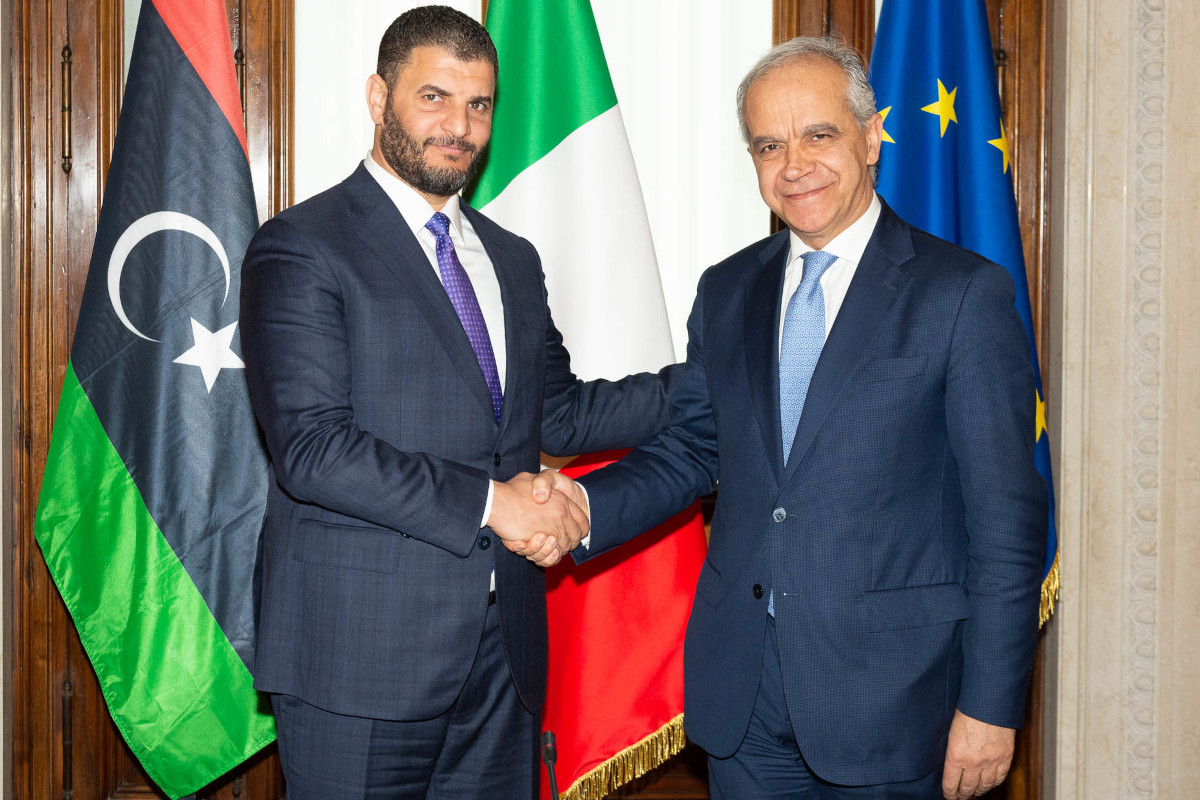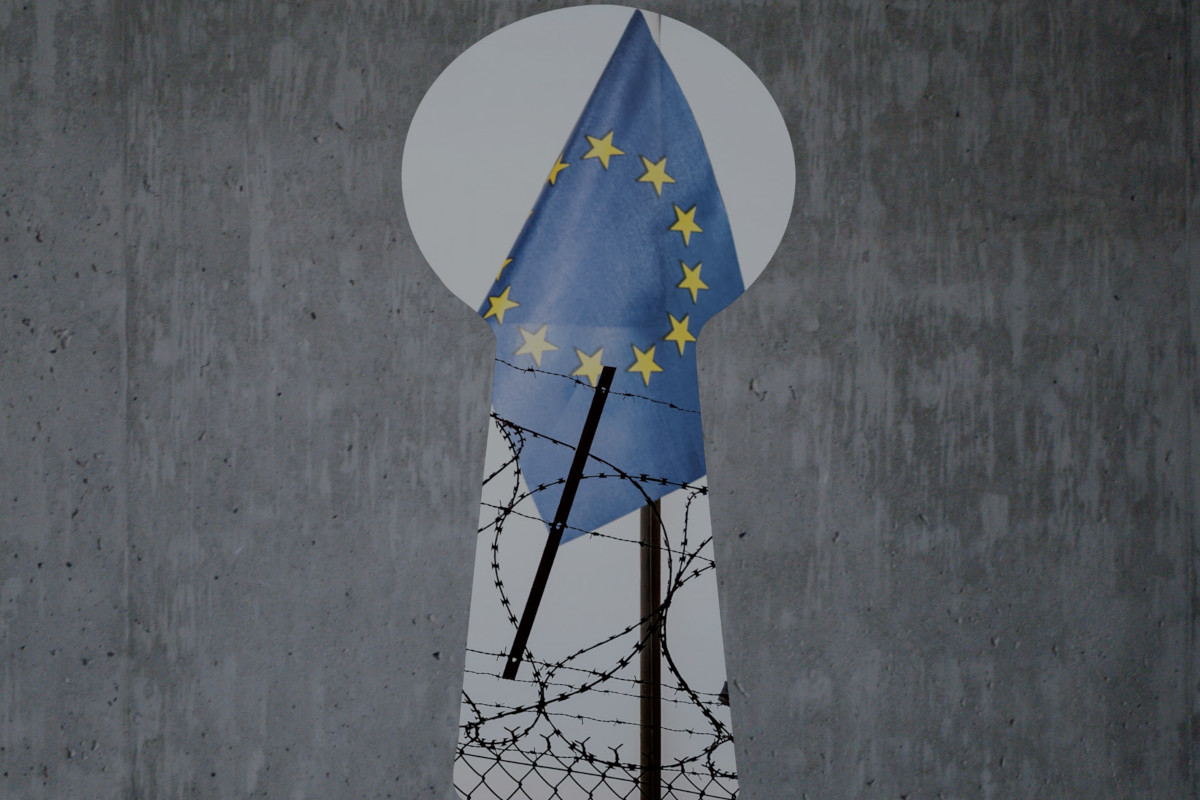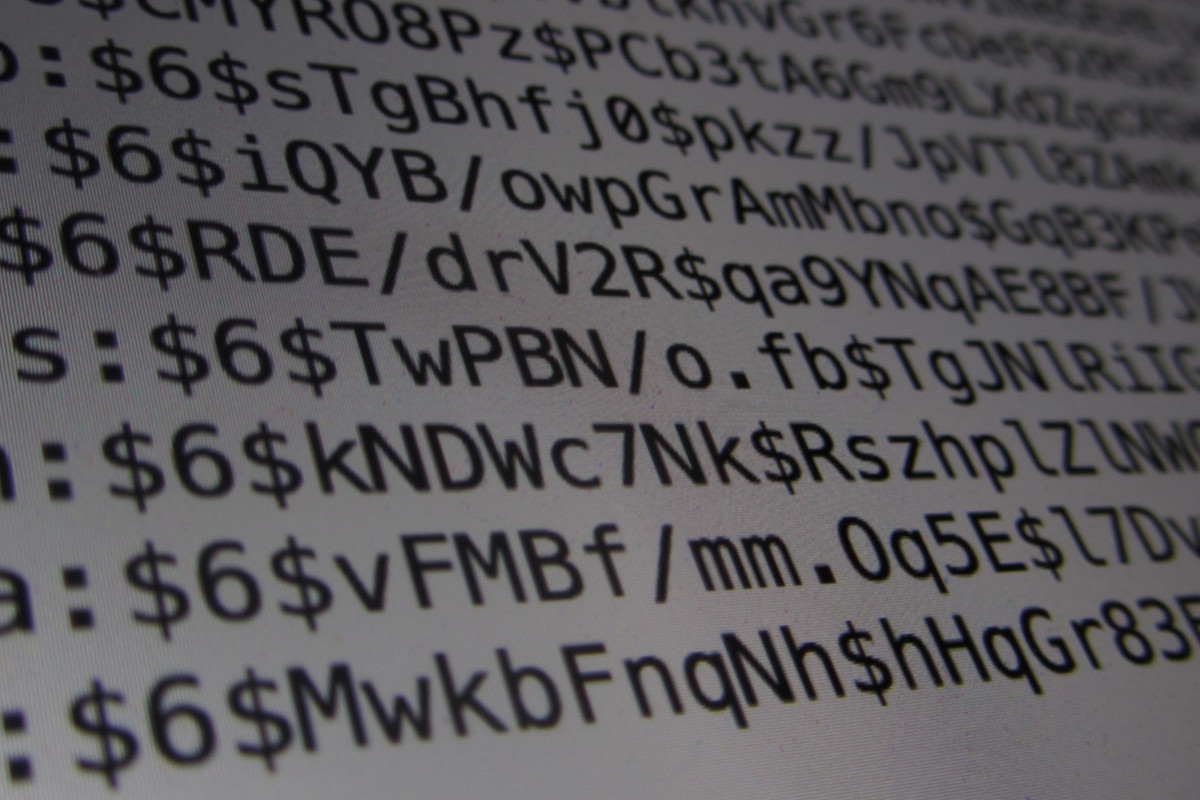Italy has nullified the right to transparency regarding borders
Topic
Country/Region
27 November 2024
The State Council has confirmed an “absolute” lack of access concerning acts related to the “management of borders and immigration”. Meanwhile, the government’s procurement worth millions of euros for Libya, Tunisia and Egypt continues.
Support our work: become a Friend of Statewatch from as little as £1/€1 per month.

Libyan interior minister Emad Al Trabelsi and his Italian counterpart, Matteo Piantedosi. Image: Italian Interior Ministry
Edited translation of an article by Duccio Facchini originally published by Altreconomia, 1 February 2024.
Italy is taking a giant and troubling step backwards in terms of transparency on borders and democratic control over the exercise of executive power. Some of Italy’s supplies to Libya to block people attempting to cross the Mediterranean, which are also military in nature, are likely to be concealed behind a dark veil.
At the end of 2023, the Council of State ruled that an "absolute" denial of access to government acts related to "border management and immigration" is not unlawful. This effectively empties the right of general public access to information of substance.
It is not a trivial matter: knowledge of documents, data and administrative information allows, or rather, should allow, participation in the life of a community, proximity between those who govern and the governed, and a conscious process to make the country’s political and managerial class accountable.
A brief summary of the facts
On 21 October 2021, the Defense Industries Agency (AID) - a public entity controlled by the Ministry of Defence - concluded a “collaboration agreement” with the Interior Ministry’s Central Directorate of Immigration and Borders.
The ministry, at the time headed by Luciana Lamorgese, asked AID for its “availability to provide collaboration for initiatives in favour of countries outside the European Union aimed at strengthening capacities in border and immigration management, as well as in the field of search and rescue at sea”.
The October 2021 agreement was “to be implemented also through the supply of means and materials” to give impetus to the second phase of the project “Support to integrated border and migration management in Libya” (SIBMMIL), financed by the EU’s Trust Fund for Africa.
The first “phase” of the project had a budget of €46.3 million. The second was allocated €15 million. The main beneficiaries of these supplies (ships, training, equipment, technology) have been Libyan coastal militias, responsible for serious human rights violations.
A few months after the agreement was signed, Altreconomia submitted an application for public access to the AID to obtain a copy of the text and annexes related to the second phase of the project. The request was denied by referring to an Interior Ministry decree from March 2022.
The purpose of that decree was to update the ‘Regulation on categories of documents withdrawn from the right of access to administrative documents’. It looks like a formality. Yet the Interior Ministry updated the list of documents “not accessible for reasons related to security, national defence and international relations.”
It added to the list those “relating to intergovernmental cooperation agreements and technical arrangements concluded for the implementation of military development, supply and/or joint support programmes or programmes for international police cooperation, as well as those concerning technical-operational arrangements for international police cooperation including border management and immigration”.
That was not all. Documents relating to cooperation between Italy and Frontex on border surveillance, “which are not already exempted from access by applying EU confidentiality classifications,” were also classified as inaccessible. This also applies to “presentations, reports and any other documents relating to problems concerning border areas… knowledge of which may prejudice security, national defence or international relations”.
Legal appeal
Altreconomia described it as a "decree that nullifies transparency about borders," lodging an appeal to the regional administrative court soon afterwards, thanks to lawyers from the organisation Association for Legal Studies on Immigration (ASGI). In the first instance decision, however, the court ruled that we were wrong.
So, we reached the Council of State, whose ruling, published in mid-November 2023, deemed our appeal unfounded, recognising that ministerial decree signed by Luciana Lamorgese in March 2022 as the “source of an absolute ban on general civic access”, without offering further reasons.
The lawyers who have accompanied us on this journey disagree.
“The Council of State has said that the ministerial decree of 16 March 2022, a secondary non-legislative source adopted to implement the regulation of a different institute, that of access to documents, has introduced an absolute limit on civic access, which may be invoked by the public administration without any justification,” observe the lawyers Giulia Crescini and Genevra Maccarone.
“This is an obvious way to circumvent the legal requirement, on a matter for which an absolute legal reservation is envisaged,” they added.
This ruling by the Council of State risks setting a worrying precedent, note Crescini and Maccarone: “this interpretation entirely empties [the right of public access] of meaning, forcing us to take a very important backwards step in terms of transparency, which is supposed to ensure the effective democratic development of a legal system.”
Supplies to Libya, Tunisia, Egypt
Meanwhile, Italian supplies to Libya to hinder migration continue. In recent months, the Interior Ministry’s Central Directorate for Immigration and Border Police (headed by Claudio Galzerano, a former head of the Europol Counter-Terrorism Centre) has resumed issuing calls for tenders or publishing, as faits accomplis, direct contracts.
Some of these concern transfers or secondments to Italy of “officers” from Libya, Tunisia, the Ivory Coast or “experts from the Turkish national police.”
For example, in January this year, a delegation of the Libyan coast guard and port security was taken to the Guardia di Finanza (customs and excise police) naval base in Capo Miseno, near Naples, for a “technical visit”.
Prior to that, other “Libyan authorities” were also trained at Capo Miseno, or at the base in Gaeta. Ivory Coast officials were on a mission from 30 October 2023 to 20 January 2024 “on the topic of returns.” They were taken to the hot spots of Lampedusa and Ventimiglia.
In December 2023, an agreement was signed between the Central Directorate of Immigration and Border Police and the General Command of the Guardia di Finanza to provide ships, assistance, maintenance, technical and logistical support to Libya, Tunisia and Egypt. Its objective was: “Capacity building in border and immigration management, search and rescue at sea.”
The National Guard of the Tunisian Ministry of the Interior will receive six coast guard vessels along with “advice, assistance and mentoring,” for a value of €4.8 million euros (the money comes from the Interior Ministry, the Guardia di Finanza provides staff, equipment and expertise).
At the beginning of January 2024, Galzerano, on the basis of an alleged request from unspecified “Tunisian authorities”, approved expenditure of “around nine million euros” (in the words of the document in question) for “the payment of fuel to naval units involved in the fight against illegal immigration and search and rescue operations" in Tunisian waters.
Where did they get the resources? From a ministerial fund dedicated to “measures aimed at preventing and combating crime and enhancing security in airport facilities and the main railway stations, including through indispensable international cooperation measures.” Who knows what the next stop will be?
Edited translation of an article by Duccio Facchini originally published by Altreconomia, 1 February 2024.
Our work is only possible with your support.
Become a Friend of Statewatch from as little as £1/€1 per month.
Further reading

Migration policy overspill: access to information in peril
It is well-documented that the externalisation of migration and border policies by the EU and other western states has led to appalling violations of human rights. While this is by far the most important issue resulting from border externalisation, there are also many other negative effects - including attacks on the right to access and impart information.

European interior ministers agreed new deportation scheme in secret
European interior ministers signed a secret joint statement in February last year that committed EU and Schengen states to increase financial and material support for deportations from the Balkans, increasing the region’s role as a migration “buffer zone”, a report published today by Statewatch and the Heinrich Böll Stiftung reveals.

UN migration data kept from the public but delivered to EU border externalisation body
In January, representatives of the International Organization for Migration (IOM) and UN refugee agency (UNHCR) gave presentations to a new EU body launched last year to propel the externalisation of migration policies. The presentations included multiple facts and figures that are no longer made public, and the UNHCR called for the UNHCR and EU member states to align their communications strategies, “without concealing challenges.”
Spotted an error? If you've spotted a problem with this page, just click once to let us know.

